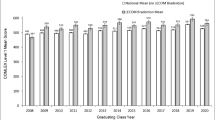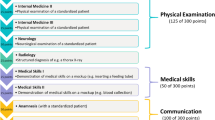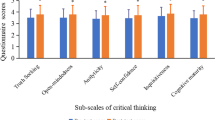Abstract
This study compared student performance in problem-based (PBL) and conventional curricula on: 1) basic science knowledge following two preclinical years; 2) the Medical Council of Canada Qualifying Examination (MCC) Part I, written upon completion of the four year MD, and 3) Part II of the MCC Qualifying Examination, an assessment of clinical performance after 17 months of postgraduate education. Students in the conventional class of 1995 (n = 81) and the PBL classes of 1996 (n = 84) and 1997 (n = 78) participated. The 1995 conventional class scored significantly higher on the knowledge test than did the 1996 PBL class. The 1997 PBL class performed similarly to the 1995 class. The MCC Part I total examination scores of the three classes were similar. However, the PBL classes of 1996 and 1997 outperformed the class of 1995 in Psychiatry (p = 0.01); also, the PBL class of 1997 outscored the classes of 1995 and 1996 in Preventive Medicine and Community Health (p = 0.001). Two classes have completed the Part II examination. The 1995 and 1996 classes scored similarly in data-gathering, problem-solving and overall. The 1995 class scored significantly higher in communication skills (p = 0.01). We conclude that the performance of PBL and conventional classes is equivalent after medical school, and during postgraduate education, and that knowledge differences found in the first PBL class after two preclinical years have disappeared at the end of fourth year. Basic science knowledge may continue to grow throughout the clinical experience. Differences in communication skills, which favoured the conventional class, require further study.
Similar content being viewed by others
References
Albanese, M. A. & Mitchell, S. (1993). Problem-based learning: A review of the literature on its outcomes and implementation issues. Academic Medicine, 68(1), 52–81.
Berkson, L. (1993). Problem-based learning. Have the expectations been met? Academic Medicine, 68(10), 579–588.
Boshuizen, M. P., Schmidt, H. G. & Wassamer, I. (1990). Curriculum Style and the Integration of Biomedical and Clinical Knowledge. Paper presented at the Second International Symposium on Problem-Based Learning, Yokyatarta, Indonesia.
Dolmans, D. H. J. M. (1994). How Students Learn in a Problem-based Curriculum. Maastricht, The Netherlands: Universitaire Pers Maastricht.
Elstein, A. S., Shulman, L. S. & Sprafka, S. A. (1978). Medical Problem-solving: An Analysis of Clinical Reasoning. Cambridge, MA: Harvard University Press.
Kaufman, D. M. & Mann, K. V. (1996). Students' perceptions about their courses in problem-based learning and conventional curricula. Academic Medicine, 71(1), s52-s54.
Kaufman, D. M. & Mann, K. V. (1997). Students' attitudes toward basic sciences in PBL and conventional curricula. Medical Education, 31, 77–80.
Kaufman, D. M. & Mann, K. V. (1998). Comparing achievement on the Medical Council of Canada Qualifying Examination Part I of students in conventional and problem-based learning curricula. Academic Medicine, 73(11), 1211–1213.
Mann, K. V. & Kaufman, D. M. (1995a). Skills and attitudes in self-directed learning: The impact of a problem-based curriculum. In A. I. Rothman & R. Cohen (Eds.) Proceedings of the Sixth Ottawa Conference on Medical Education (pp. 607–609). Toronto, ON: University of Toronto Bookstore.
Mann, K. V. & Kaufman, D. M. (1995b). A response to the ACME-TRI Report: The Dalhousie problem-based learning curriculum. Medical Education, 29, 13–21.
Martenson, D., Eriksson, H. & Ingelman-Sundberg, M. (1985). Medical chemistry: Evaluation of active and problem-oriented teaching methods. Medical Education, 19, 34–42.
Medical Council of Canada (1977). Information pamphlet — Qualifying Examination Part I. Ottawa, ON: Medical Council of Canada.
Mennin, S. P., Kalishman, B., Friedman, M., Pathak, D. & Snyder, J. (1996). A survey of graduates in practice from the University of New Mexico's conventional and community-oriented, problem-based tracks. Academic Medicine, 71, 1079–1089.
Mennin, S. P., Friedman, M., Skipper, B., Kalishman, S. & Snyder, J. (1993). Performances on the NBME I, II and III, by medical students in the problem-based learning and conventional tracks at the University of New Mexico. Academic Medicine, 68, 616–624.
Moore, G. T., Black, S. D., Briggs Style, C. & Mitchell, R. (1994). The influence of the New Pathway Curriculum on Harvard medical students. Academic Medicine, 69, 983–989.
Norman, G. R. & Schmidt, H. G. (1992). The psychological basis of problem-based learning: A review of the evidence. Academic Medicine, 67(9), 557–565.
Patel, V. L., Groen, G. J. & Norman, G. R. (1991). Effects of conventional and problem-based curricula on problem-solving. Academic Medicine, 66, 380–389.
Regehr, G. & Norman, G. R. (1996). Issues in cognitive psychology: Implications for professional education. Academic Medicine, 71, 988–1001.
van der Vleuten, C. (1996). The assessment of professional competence: Developments, research and practical implications. Advances in Health Sciences Education, 1(1), 41–67.
Vernon, D. T. A. & Blake, R. L. (1993). Does problem-based learning work? A meta-analysis of evaluative research. Academic Medicine, 68(7), 950–963.
Woodward, C. A. (1996). Problem-based learning in medical education: Developing a research agenda. Advances in Health Sciences Education, 1, 83–94.
Woodward, C. A., Ferrier, B. M., Cohen, M. & Goldsmith, A. (1990). A comparison of the practice patterns of general practitioners and family physicians graduating from McMaster and other Ontario medical schools. Teaching and Learning in Medicine, 2, 79–88.
Author information
Authors and Affiliations
Rights and permissions
About this article
Cite this article
Kaufman, D.M., Mann, K.V. Achievement of Students in a Conventional and Problem-Based Learning (PBL) Curriculum. Adv Health Sci Educ Theory Pract 4, 245–260 (1999). https://doi.org/10.1023/A:1009829831978
Issue Date:
DOI: https://doi.org/10.1023/A:1009829831978




